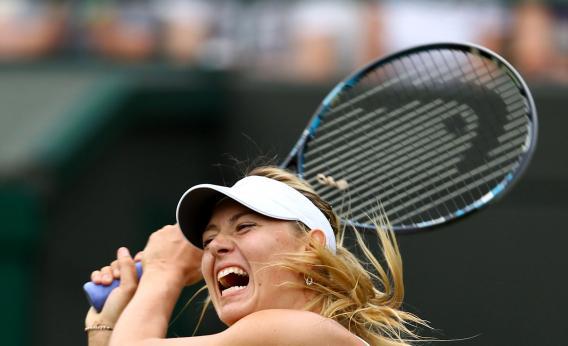September 2003. A group of us from the high school tennis team drilled forehands in the near-dark. It was not our finest moment; in fact, we sucked, spraying balls all over the court, barely getting into position for the next shot. “The Lincoln Memorial called,” our coach kept bellowing, “He wants his footwork back!” After 20 or so minutes of this, coach made a novel suggestion. “Girls,” he said, “I want you to grunt.”
It worked. Every time one of us hit the ball, she’d uncork a huge howl from deep within her gut. Our footwork improved, our shots started landing in the lines—or at least clearing the net—and for a moment we were actually playing tennis.
Which is just one of the reasons I was dismayed to read that the Women’s Tennis Association wants to start regulating grunting. Convinced that loud female grunts distract opponents and annoy fans, the organization unveiled a plan to 1) develop a hand-held device with which refs can measure on-court grunting levels, 2) set a maximum volume for grunting during a match, and 3) teach aspiring woman athletes at tennis academies and development programs how to compete quietly.
This quest for a daintier and more decorous women’s circuit has been blessed by luminaries like nine-time Wimbledon singles champion Martina Navratilova, who insists that female players’ grunts are “louder and more abrasive” than men’s. (How does she know? Did she get a trial version of the grunt-o-meter?) Even feminist icon Billie Jean King seems to regard the WTA’s campaign against “excessive grunting” as a step forward.
But forward toward what? Not necessarily better tennis. Anecdotally and scientifically, grunting can take a player’s game to the next level: It promotes focus and concentration, helps with timing, and even disguises the sound of the ball, so that the opponent can’t quite anticipate the direction of the next shot. Perhaps that hint of gamesmanship is what led athletes like Denmark’s Caroline Wozniacki and Serbia’s Jelena Jankovic to call for muter courts, especially given the dominance of the gloriously grunty Maria Sharapova and Victoria Azarenka.
Fair play has become the veneer under which the anti-grunt brigade hides its sexism. Favorable coverage of the WTA’s plan suggests that, while male players groan out of necessity, women in tennis are engaged in a kind of “ritualized yelling.” Their vocalizations aren’t “natural” or “involuntary,” but “tactical.” At least, so says Business Insider’s Tony Manfred in an article dubbed, charmingly, “No, Wanting Women’s Tennis Players To Stop Screaming All The Time Doesn’t Make You Sexist.”
“Male and female tennis players don’t grunt with equal frequency and vigor,” Manfred writes. “The grunts in women’s tennis … aren’t the result of intense physical exertion over a long period of time.” Instead, they represent “a superficial, ear-splitting tactic used for a variety of reasons.”
Even if he’s right (and to me, his claim—girls don’t naturally make unattractive noises; they’re just being manipulative—earns a big WTF), I’m not sure I buy the subsequent argument, which boils down to: Well, men aren’t doing it, so women shouldn’t be allowed to, either.
Because, so what if lady tennis players grunt in part to distract each other? As Erin Ryan over at Jezebel observes, professional sports are rife with intended and unintended distractions: “Baseball players adjusting their balls all the time … Ugly goalie helmets in hockey … Corporate logos splashed all over every single golf tournament.” Anna Kournikova’s beauty is distracting, as are Michael Phelps’ ears and the mere fact of Dennis Rodman. And it seems to be mostly fans, former or waning stars, and officials who are complaining about the grunting anyway. If female players sounding their barbaric yawps on the Wimbledon green prove sooo distracting, perhaps the better question is: Why?
Because of sex. A woman grunting on the tennis court sounds like she’s having a baby or having sex. And not very ladylike sex—primal, bestial, no-holds-barred sex, the kind that stodgy Wimbledon-goers are loathe to imagine in their country club. With that specter of nooky comes empowerment and a possible inversion of gender norms: What else can these Amazonian women pull off without male assistance?
The crackdown will take some time to implement—former athletes, WTA officials, and other experts all agree it would be unfair to ask the current crop of stars to suddenly relearn their breathing techniques. Meanwhile, for the players coming up, competing in the sport they love and are good at, shouting must be a pure expression of agency. I still remember the thrill of releasing a huge, ugly grunt when my racket made contact with the tennis ball, all those years ago. No one had ever told me it was okay to make noises like that. It felt great.
